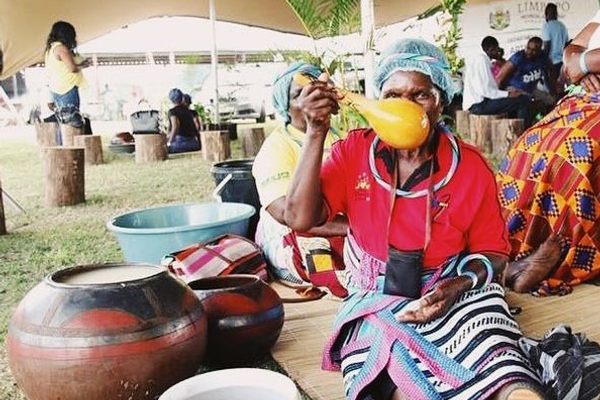Drinks
Tchoukoutou
In Togolese markets, locals socialize over gourds of this sweet-and-sour sorghum beer.
In Togo, West Africa, when people talk of la boisson (“the drink”), they are referring to tchoukoutou. Tchouk for short, tchoukoutou is a home-brewed beer made from sorghum (and sometimes millet) that is central to Togolese social and ritual life.
Making and selling tchouk is a way that many West African women are able to make ends meet. They prepare the drink in a several-day process that involves boiling malted, ground grains with water, then allowing the mixture to ferment. The result is a reddish-brown, lightly sparkling brew with a cidery sweetness and yogurty tang.
On weekly market days in many small towns and villages in Togo, tchoukoutou is the focal point. Among tiny dried fish, bouillon cubes, and secondhand clothing from abroad, locals gather in thatched stalls and sit on wooden planks for hours, drinking the beverage and discussing the latest community news. In the market, you won’t find tchouk in bottles or glasses, but instead, scooped from waist-high plastic bins into half-gourd bowls called calabashes. There is usually no refrigerator in sight, so tchouk is enjoyed at a lukewarm temperature that brings out its earthy sour-sweetness.
But tchoukoutou’s significance extends beyond socializing. From births to marriages to funerals, tchoukoutou plays a large role in nearly all traditional rituals. During certain ceremonies among the Lamba people, for instance, the effigy of a recently deceased person’s corpse is splattered with tchoukoutou. Across Togo, it is customary to spill a little bit from your calabash on the ground “for the ancestors” before drinking.
Thanks to its affordable price, many people can enjoy this versatile boisson. A small calabash typically costs 100 CFA francs (about 17 cents in US currency) instead of the 600 CFA francs (approximately $1) for a comparably sized large bottle of commercially manufactured beer.
Written By
 Carla Seidl
Carla Seidl











